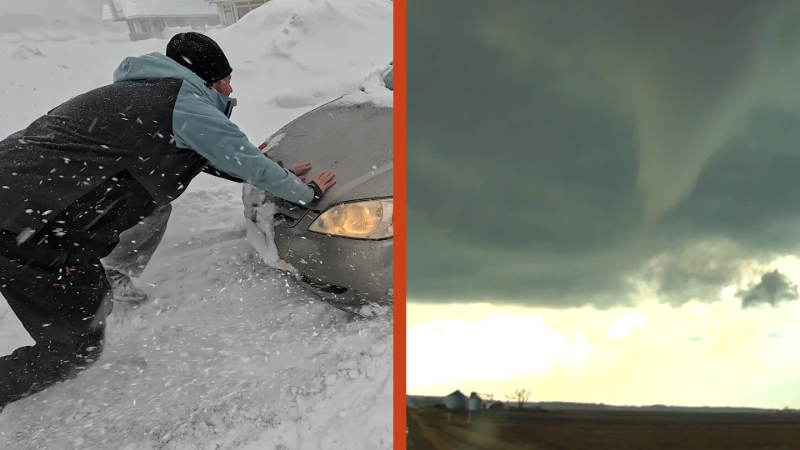The dangers of using a generator after a hurricane
Carbon monoxide poisoning, electrocution and fire are all potentially fatal risks of misusing portable generators.

Debris blocks FM2031, the main access road, after Hurricane Beryl came ashore nearby Monday, July 8, 2024, in Matagorda. (Jon Shapley/Houston Chronicle via Getty Images)
In the aftermath of a hurricane, when power outages can stretch on for days, having a generator at home can be a lifesaver. However, this essential device comes with serious risks if not used correctly.
Improper use of portable generators can lead to carbon monoxide poisoning, electrocution, and even fires, posing potentially fatal dangers to families who rely on them. Understanding and following safety guidelines is crucial to ensure that your generator provides help, not harm, during these critical times.

Carbon monoxide poisoning
Portable generators produce as much carbon monoxide as hundreds of cars and can kill a person within minutes, according to the Consumer Product Safety Commission (CPSC).
Carbon monoxide poisoning sends more than 20,000 people to the emergency room each year, according to the National Institute of Standards and Technology (NIST). This is why generators should never be operated anywhere inside a home, including in garages or basements.
It’s the Atlantic hurricane season, which means it’s possible that you’ll need your portable generator. Follow these tips for operating generators safely to avoid carbon monoxide poisoning.
A 2023 CPSC report showed that portable generators were linked to more than 85 percent of non-fire carbon monoxide deaths associated with engine-driven tools between 2012 to 2022.
“If you’re using a portable generator, it needs to be a minimum of 30 feet away from the house while it’s running to eliminate the possibilities of carbon monoxide poisoning,” said Keith Pinkerton, franchise owner of global electrical service company Mr. Electric.
The Occupational Safety and Health Administration (OSHA) recommends placing the generator in a location with 3 to 4 feet of clear space on all sides to ensure proper ventilation.
The Consumer Product Safety Commission (CPSC) advises that generators should be used in dry areas and kept away from windows, doors, and any other openings in the home.
Quickly recognizing the symptoms of carbon monoxide poisoning can mean the difference between life and death. These include dizziness, blurred vision, loss of consciousness, shortness of breath and nausea and vomiting, according to the Mayo Clinic.
People experiencing any symptoms should get to a place with fresh air immediately and seek professional medical help.
“The National Fire Protection Association (NFPA) recommends that a carbon monoxide alarm be placed on every floor of the home and also outside of every sleeping area,” said Stephanie Berzinski, Senior Manager of Communications at Kidde," a fire safety manufacturing company.

Scandar Myles (L) and Kendrick Cook start a generator after Hurricane Ida on September 2, 2021 in Hammond, Louisiana. The storm made landfall as a Category 4 hurricane Sunday in Louisiana and brought flooding, wind damage and power outages along the Gulf Coast. (Photo by Sean Rayford/Getty Images)
Electrical shock and electrocution
The risk of electrical shock or electrocution while using a generator can be high following severe weather, especially when flooding is a factor. Pinkerton said using a generator isn’t advised if floodwaters have entered a home.
“If the house is flooded, you actually need to try to turn the main breaker off if power is still in the house,” said Pinkerton.
“We’ve actually seen on the news where people sit in water with lights on; they’re just fortunate that either the breakers tripped on those outlets, or they’re just sitting ducks about to be electrocuted,” he added.
People operating generators should avoid backfeeding their homes, which means connecting the generator to power outlets inside the home. Not only is it illegal, but it can have dire consequences for people both inside and outside the house.
“It can electrocute you, your entire home, your neighbors and the [utility workers] that are trying to restore power,” Cooksey said.
OSHA advised never to attach a generator directly to the home or building’s structure unless a qualified electrician has installed a transfer switch onto the device, OSHA advises.
It’s also important to use a heavy-duty, outdoor-rated extension cord that has been checked for any cuts and tears, according to the NFPA.
Fire dangers
Generators and their fuel can pose fire hazards if not handled correctly. These devices heat up while running and can remain hot for a long time even after being turned off.
The National Fire Protection Association (NFPA) recommends allowing the generator to cool down before refueling, and advises against refueling while it is still operating.
According to the Occupational Safety and Health Administration (OSHA), gasoline and other fuel containers should be kept away from the generator, as well as from water heaters, cigarettes, and lighters.
OSHA also states that fuels should not be stored inside the home and should be kept away from living areas.
Additionally, it is important to avoid fuel spills, as fuels can ignite if they come into contact with the generator’s hot parts.
By following these guidelines, you can safeguard your home and family while effectively managing power outages during hurricane recovery.
Want next-level safety, ad-free? Unlock advanced, hyperlocal severe weather alerts when you subscribe to Premium+ on the AccuWeather app. AccuWeather Alerts™are prompted by our expert meteorologists who monitor and analyze dangerous weather risks 24/7 to keep you and your family safer.
Report a Typo














